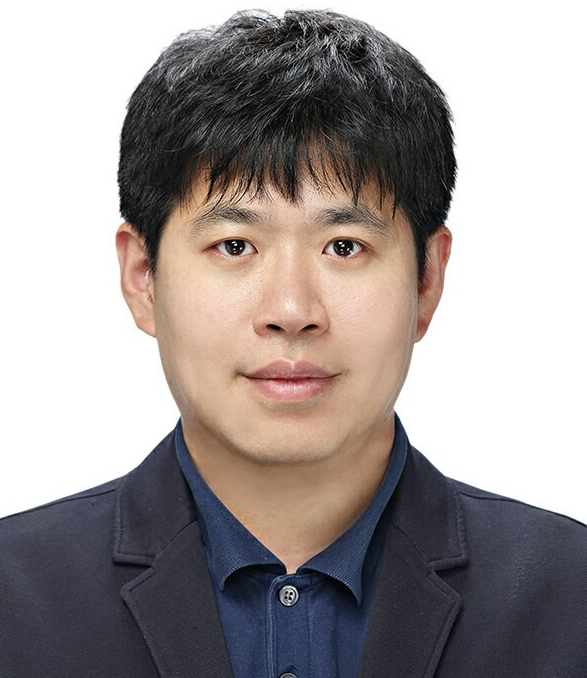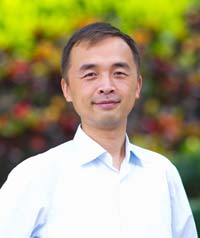Quantum Machine Learning Applications to Autonomous Mobility

Dr. Joongheon Kim
Korea University
Abstract. In this keynote, we will present the fundamental theory of quantum machine learning (QML) and its emerging applications. Thanks to the recent evolution in quantum computing, numerous research results have been proposed for the development of theories and applications of QML. In this speech, the advantages and benefits of QML-based models and algorithms are also discussed, i.e., fast learning convergence, high action-dimension scalability, and efficient training parameter utilization. Based on the design concept and advantages, QRL-based models and algorithms are used for various emerging applications. Among them, this talk also introduces the applications of QML-based models and algorithms in terms of future autonomous mobility services and distributed computing platforms.
Biography. Dr. Joongheon Kim has been with Korea University, Seoul, Korea, since 2019, where he was the Deputy Vice President, Office of Academic Affairs, and Dean Center for Teaching and Learning (CTL). He is currently a director for Net-Zero CAFE (Connectivity and Autonomy for Future Ecosystem) Research Center, sponsored by the Korean Ministry of Science and ICT (MSIT). He received the B.S. and M.S. degrees in computer science and engineering from Korea University, Seoul, Korea, in 2004 and 2006; and the Ph.D. degree in computer science from the University of Southern California (USC), Los Angeles, CA, USA, in 2014. Before joining Korea University, he was a research engineer with LG Electronics (Seoul, Korea, 2006--2009), a systems engineer with Intel Corporation (Santa Clara, CA, USA, 2013--2016), and an assistant professor with Chung-Ang University (Seoul, Korea, 2016--2019). He serves as an editor for IEEE Transactions on Vehicular Technology and IEEE Internet of Things Journal. He was a recipient of Annenberg Graduate Fellowship from USC (2009), Intel Corporation Next Generation and Standards (NGS) Division Recognition Award (2015), IEEE Systems Journal Best Paper Award (2020), IEEE ComSoc Multimedia Communications Technical Committee (MMTC) Outstanding Young Researcher Award (2020), IEEE ComSoc MMTC Best Journal Paper Award (2021), He also received IEEE ICOIN Best Paper Award (2021), IEEE ICTC Best Paper Award (2022), and IEEE Vehicular Technology Society (VTS) Seoul Chapter Awards.
Facility Location Games, a gem in mechanism design

Dr. Minming Li
City University of Hong Kong
Abstract. Mechanism Design, as one of the important areas in algorithmic game theory, can be classified into two categories: with money and without money. Facility location game is one of the mostly studied problem in mechanism design without money. Procaccia and Tennenholtz proposed and studied the problem back in 2009, where there are n agents on a line and the government will build a facility in a certain location given the agents reported information on their positions. The government wants to make sure truth-telling is the best strategy for every agent while achieving some optimization objective. Since then, some bounds on the approximation ratios of the truthful mechanisms have been improved and new models are proposed. In this talk, we will briefly explain the story of the classic model and emphasize on the recent development on new models proposed by us and other groups, including models considering the effect of social networks.
Biography. Minming Li is a Professor in Department of Computer Science, City University of Hong Kong. He received his Ph. D. and B.E. degree in the Department of Computer Science and Technology at Tsinghua University in 2006 and 2002 respectively. His research interests include algorithmic game theory, combinatorial optimization and algorithm design and analysis for scheduling problems. He has been consistently working on the theoretical aspects of computer science with a wide scope of application background. The full publication can be found at https://dblp.org/pid/78/6881.html. He is serving as associate editors for a number of journals including Omega, Journal of Scheduling and Journal of Combinatorial Optimization. He has organized conferences COCOA 2016, FAW 2020, ISAAC 2020 as PC chairs. He has also served as chairperson of ACM Hong Kong Chapter from 2016 to 2018. He was a recipient of Teaching Excellence Award given by City University of Hong Kong and Outstanding Supervisor Award. Currently he is ACM Distinguished Speaker.
Modeling to support sustainability science: how open agent-based platforms can foster transdisciplinary approaches

Dr. Alexis Drogoul
French National Research Institute for Sustainable Development (IRD)
Abstract. Open-source agent-based modeling and simulation platforms (ABPs) such as GAMA offer powerful tools for simulating the evolution of complex socio-environmental systems. However, the design, construction, maintenance, and evolution of these platforms pose significant research and software engineering challenges, particularly in fast-growing fields such as sustainability science, which, by its cross-disciplinary nature, emphasizes the use of inter- and trans-disciplinary methods while tackling issues of unprecedented complexity. This translates into a growing demand for openness, coupling, participation, interactivity, interpretability, scalability and integration of modeling with the various scientific practices of sustainability, themselves increasingly based on the virtual exploration of potential scenarios. After an introduction to GAMA and a brief account of its 17-year history, I will compare GAMA's current capabilities with these emerging demands, highlighting areas where research efforts are needed. This presentation also aims to inform the future development of open source ABPs, ensuring that they remain at the forefront of open science practices and facilitate innovative research and stakeholder interaction in areas such as sustainability science. Examples will be drawn from current applications in Vietnam, which support transdisciplinary approaches through new visualization techniques (tangible interfaces, virtual reality) to enhance stakeholder engagement.
Biography. Alexis Drogoul holds a PhD and a habilitation thesis in computer science. He was a professor at Sorbonne University from 1994 to 2004, and since 2005 has been a senior researcher at IRD, the French National Research Institute for Sustainable Development. His work, which has been the subject of over 200 articles, focuses on the development of software tools (such as GAMA, http://gama-platform.org) to support the modeling and simulation of socio-environmental systems, with a view to facilitating interdisciplinary work and involving social actors in model construction. In this capacity, he has helped define the fundamental concepts of "agent-based modeling", while working on numerous applications of this paradigm for environmental decision support, notably in Vietnam, where he has helped build several research laboratories on this theme since 2006.